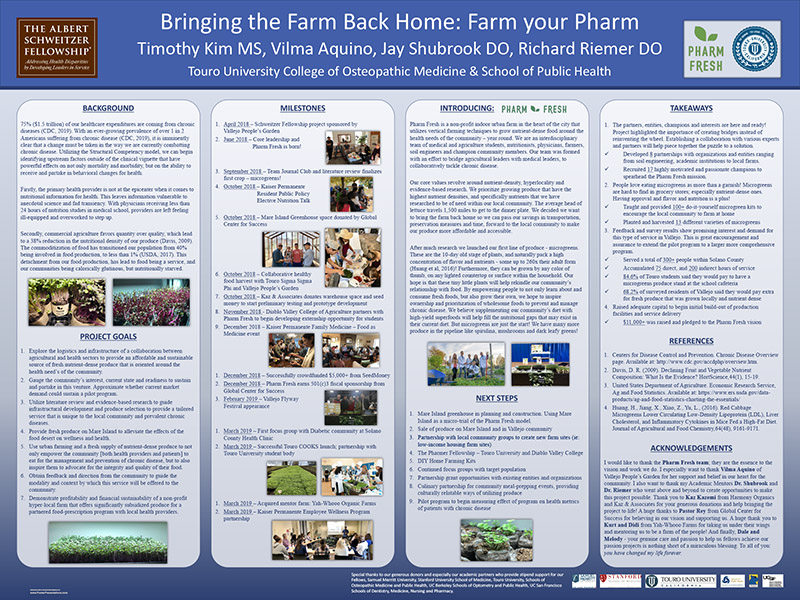
Hover to pan and click to magnify. Click again to pan at full screen.
Timothy Kim MS, Vilma Aquino, Jay Shubrook DO, Richard Riemer DO
Touro University College of Osteopathic Medicine & School of Public Health
Bringing the Farm Back Home: Farm your Pharm
Timothy Kim MS, Vilma Aquino, Jay Shubrook DO, Richard Riemer DO
Touro University College of Osteopathic Medicine & School of Public Health
BACKGROUND
75% ($1.5 trillion) of our healthcare expenditures are coming from chronic diseases (CDC, 2019). With an ever-growing prevalence of over 1 in 2 Americans suffering from chronic disease (CDC, 2019), it is imminently clear that a change must be taken in the way we are currently combatting chronic disease. Utilizing the Structural Competency model, we can begin identifying upstream factors outside of the clinical vignette that have powerful effects on not only mortality and morbidity, but on the ability to receive and partake in behavioral changes for health.
Firstly, the primary health provider is not at the epicenter when it comes to nutritional information for health. This leaves information vulnerable to anecdotal science and fad transiency. With physicians receiving less than 24 hours of nutrition studies in medical school, providers are left feeling ill-equipped and overworked to step up.
Secondly, commercial agriculture favors quantity over quality, which lead to a 38% reduction in the nutritional density of our produce (Davis, 2009). The commoditization of food has transitioned our population from 40% being involved in food production, to less than 1% (USDA, 2017). This detachment from our food production, has lead to food being a service, and our communities being calorically glutinous, but nutritionally starved.
PROJECT GOALS
1. Explore the logistics and infrastructure of a collaboration between agricultural and health sectors to provide an affordable and sustainable source of fresh nutrient-dense produce that is oriented around the health need’s of the community.
2. Gauge the community’s interest, current state and readiness to sustain and partake in this venture. Approximate whether current market demand could sustain a pilot program.
3. Utilize literature review and evidence-based research to guide infrastructural development and produce selection to provide a tailored service that is unique to the local community and prevalent chronic diseases.
4. Provide fresh produce on Mare Island to alleviate the effects of the food desert on wellness and health.
5. Use urban farming and a fresh supply of nutrient-dense produce to not only empower the community [both health providers and patients] to eat for the management and prevention of chronic disease, but to also inspire them to advocate for the integrity and quality of their food.
6. Obtain feedback and direction from the community to guide the modality and context by which this service will be offered to the community.
7. Demonstrate profitability and financial sustainability of a non-profit hyper-local farm that offers significantly subsidized produce for a partnered food-prescription program with local health providers.
INTRODUCING
Pharm Fresh is a non-profit indoor urban farm in the heart of the city that utilizes vertical farming techniques to grow nutrient-dense food around the health needs of the community – year round. We are an interdisciplinary team of medical and agriculture students, nutritionists, physicians, farmers, soil engineers and champion community members. Our team was formed with an effort to bridge agricultural leaders with medical leaders, to collaboratively tackle chronic disease.
Our core values revolve around nutrient-density, hyperlocality and evidence-based research. We prioritize growing produce that have the highest nutrient densities, and specifically nutrients that we have researched to be of need within our local community. The average head of lettuce travels 1,500 miles to get to the dinner plate. We decided we want to bring the farm back home so we can pass our savings in transportation, preservation measures and time, forward to the local community to make our produce more affordable and accessible.
After much research we launched our first line of produce - microgreens. These are the 10-day old stage of plants, and naturally pack a high concentration of flavor and nutrients - some up to 260x their adult form
(Huang et al, 2016)! Furthermore, they can be grown by any color of thumb, on any lighted countertop or surface within the household. Our hope is that these tiny little plants will help rekindle our community’s relationship with food. By empowering people to not only learn about and consume fresh foods, but also grow their own, we hope to inspire ownership and prioritization of wholesome foods to prevent and manage chronic disease. We believe supplementing our community’s diet with high-yield superfoods will help fill the nutritional gaps that may exist in their current diet. But microgreens are just the start! We have many more produce in the pipeline like spirulina, mushrooms and dark leafy greens!
NEXT STEPS
1. Mare Island greenhouse in planning and construction. Using Mare Island as a micro-trial of the Pharm Fresh model.
2. Sale of produce on Mare Island and in Vallejo community
3. Partnership with local community groups to create new farm sites (ie: low-income housing farm sites)
4. The Pharmer Fellowship – Touro University and Diablo Valley College
5. DIY Home Farming Kits
6. Continued focus groups with target population
7. Partnership grant opportunities with existing entities and organizations
8. Culinary partnership for community meal-prepping events, providing culturally relatable ways of utilizing produce
9. Pilot program to begin measuring effect of program on health metrics of patients with chronic disease

Present with Google Meet
Invite as many as 30 people, and present your poster in high definition. Transcription option is available. Free to use.
DISQUS COMMENTS WILL BE SHOWN ONLY WHEN YOUR SITE IS ONLINE